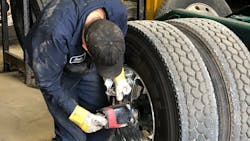Even those asleep at the wheel are feeling pretty good about their businesses these days. The last three years haven't been easy, but the outcome has delivered solid results for most everyone in the tire and service industry.
Let’s look at how far we’ve come.
In 2020, we learned that what we knew was no more and vulnerability was a real thing. Our comfort zones were disrupted and we were forced to adapt at speeds that we hadn’t really seen before.
In 2021, those dealers who were super-agile thrived. They were proactive and their employee retention proved it.
But in 2022, we discovered that the market competing for our team members had gotten aggressive. Those who were hesitant to adapt in 2021 felt the hurt and struggled to keep a strong team.
How do you keep a strong team? By requiring your team members to have ownership or at least a sense of ownership.
You may often wonder why members of your team don’t take ownership the way you do. I hear it all the time.
We expect our team members to take ownership of their positions. We expect our team members to make judgement calls as though the outcome or cost of those decisions came from their own check book.
We also expect our team members to manage our reputation as though it was their own social media page.
The majority of store owners and managers in our industry have lofty expectations of their teams. Some are totally well-founded, while yet others are not.
How do you engender a sense of ownership? First, you need to give credence to the expectations that are set. Moreover, you need to define and outline a path to success that is simple, logical and mutually beneficial.
I also recommend designing and implementing pay systems that lead the market – not follow it.
A successful and lasting pay system should be defined by production-based goals that feed both the business and the employee.
Here are a few considerations that may help you design a successful pay system of your own.
First, to truly hold anyone accountable for anything, you should reference the 75% rule. This means not holding employees accountable for anything they do not have at least 75% control over.
A perfect example is the spiff system that many dealerships use. A general service technician finds an air filter and if it’s sold, he gets a buck. A pair of wiper blades nets two bucks. You get it.
However, does that technician have 75% or more control over whether or not those items or services get sold? Absolutely not. But do they have control over whether inspections get done or not? Absolutely!
Second, a rate increase, whether flat or hourly, doesn’t actually motivate teams for any significant amount of time. The reward on the new investment is, at best, temporary.
Instead of flat or hourly raises, consider aligning your gross profit goals with your employees’ pay goals. Have a real conversation about how much money your team members would like to make and develop a goal system, based on things they have 75% control or more over, to help them get there.
You could tie it to training, professional development, quarterly reviews, gross profit, efficiency measures or other metrics. There’s a ton of options.
Finally, make it a team thing. While owners and managers consider themselves accountable for developing good teams, it’s really each team member being accountable to the rest that engenders true success.
Chances are you have more than one person in each segment of your business who’s on a specific type of pay program. Lump their goals together and provide bonuses based on their success.
It’s often said that employees usually leave because of bad management, which is true. But they often stay because of their team.




